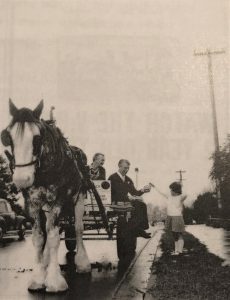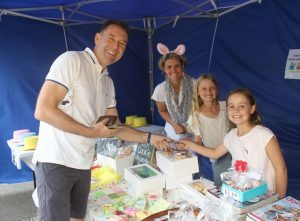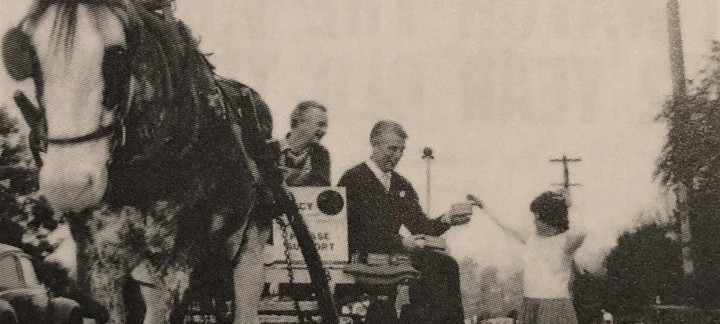In the chilly morning hours of June 1964, when the milkman made his daily deliveries in the Melbourne suburbs, thousands of generous Victorians handed over small change as they paid for and collected their milk. This was known as the ‘Mercy Milk Run’, part of the then Mercy Private Hospital’s ‘Make Mercy Your Mission’ public appeal. The ‘Mercy Milk Run’ raised a total £40,000 towards this ambitious goal.
The appeal was also helped by a Miss Mercy Quest beauty pageant (in the style of the Miss Victoria Quest); card parties, lunches, art shows and fashion parades run by local fundraising committees; car raffles; and contributions from generous benefactors such as Melbourne’s Lord Mayor Sir Leo Curtis, affluent society people, businessmen and regular Mercy supporters.(1)
The campaign aimed to raise “half a million pounds towards the three million needed for a 220 bed public maternity hospital”.(2) By that time, Mercy Private Hospital had cemented its reputation as an excellent health provider among Melbourne’s middle class, but the Sisters’ desire was to extend its services to poorer women in the community.(3)

The Mercy Milk Run from the ‘Make Mercy Your Mission Campaign’ in the early 1960s.
After many years of planning and campaigning, the Mercy Maternity Hospital finally opened in East Melbourne in February 1971. In March of the same year, it began admitting public patients.
Community partnerships and fundraising campaigns like ‘Make Mercy Your Mission’ have played a pivotal role in Mercy Health’s 100-year history, enabling the organisation to extend its service offering to more areas of the community and advance its mission ‘to bring God’s mercy to those in need’.
Alongside government funding, these partnerships and campaigns made possible the expansion of Mercy Health’s services to the western suburbs of Melbourne in 1994 with the opening of the Werribee Mercy Hospital. In 2018, with the help of funds raised from the annual Werribee Fair, the Werribee Hospital Foundation, corporate and community supporters, the hospital expanded its services to include a state-of-the-art Intensive Care Unit, 56 new inpatient beds, six new operating theatres, a Central Sterilising Department, a wellness room and a new multi-level car park. This is just one example of community support among many that make up the Mercy Health story.

Mercy Health Group Chief Executive Adjunct Professor Stephen Cornelissen with Nurse Unit Manager Kate Bermingham and her daughters at the Werribee Mercy Hospital Easter Fair in 2018.
To continue to meet the needs of Melbourne’s west, we look forward to working with the community and government to expand the physical capacity and service offerings of Werribee Mercy Hospital, including expansion of our Emergency Department and Paediatrics Ward.
To formalise Mercy Health’s long tradition of philanthropic fundraising, the Mercy Health Foundation was established in 2009. Since then, the Foundation has been the organisation’s fundraising epicentre, generating campaigns such as the annual Mercy Health Foundation Ball, the Christmas Appeal and the Tax Appeal to raise money for ventures such as Mercy Perinatal and the Mercy Health Breastmilk Bank.
Community partnerships and fundraising campaigns have played a pivotal role in Mercy Health’s 100-year history
Mercy Health Group Chief Executive Adjunct Professor Stephen Cornelissen says “Mercy Health would not exist today without the generous support of members from the community. Every one of them has played a key role in our organisation’s proud 100-year history and will continue to for the next 100 years.”
If you would like to support Mercy Health’s mission ‘to bring God’s Mercy to those in need’, visit: mercyhealthfoundation.org.au
Did you know?
• The population of the City of Wyndham is projected to grow by 102 per cent between 2016 and 2036, compared to 28 per cent in the rest of the state.
• Demand for public healthcare in Wyndham will grow by 145.6 per cent in the same period.
References
(1) Alves, L. People of Mercy: A History of Mercy Hospital for Women 1971-2004, Australian Scholarly Publishing, Melbourne, 2004, p.6.
(2) Ibid., p.5.
(3) Ibid., p.4.
Photos from People of Mercy: A History of Mercy Hospital for Women 1971-2004 by Lesley Alves
Last reviewed December 15, 2020.



